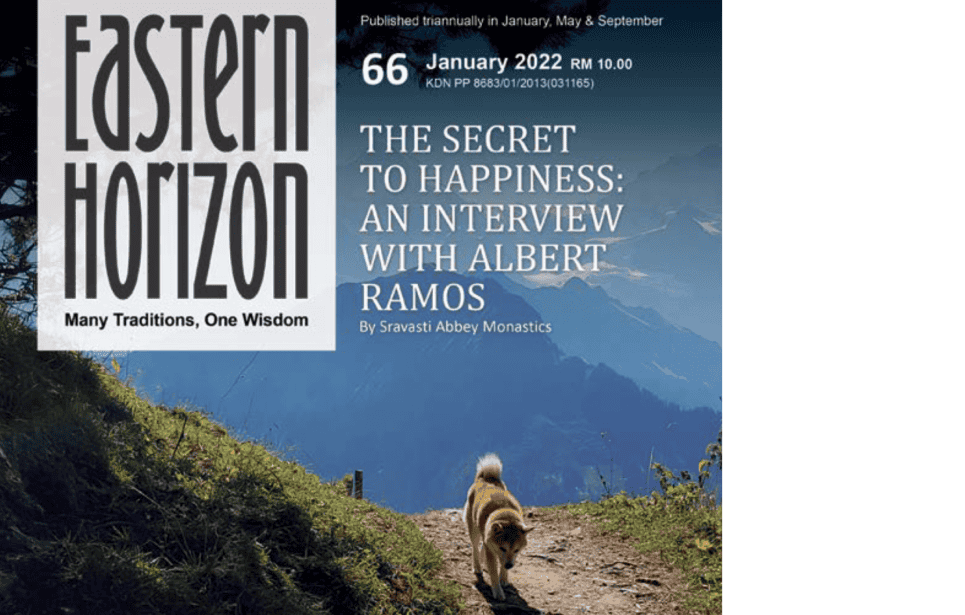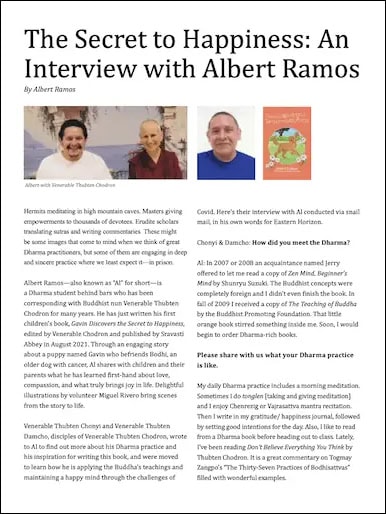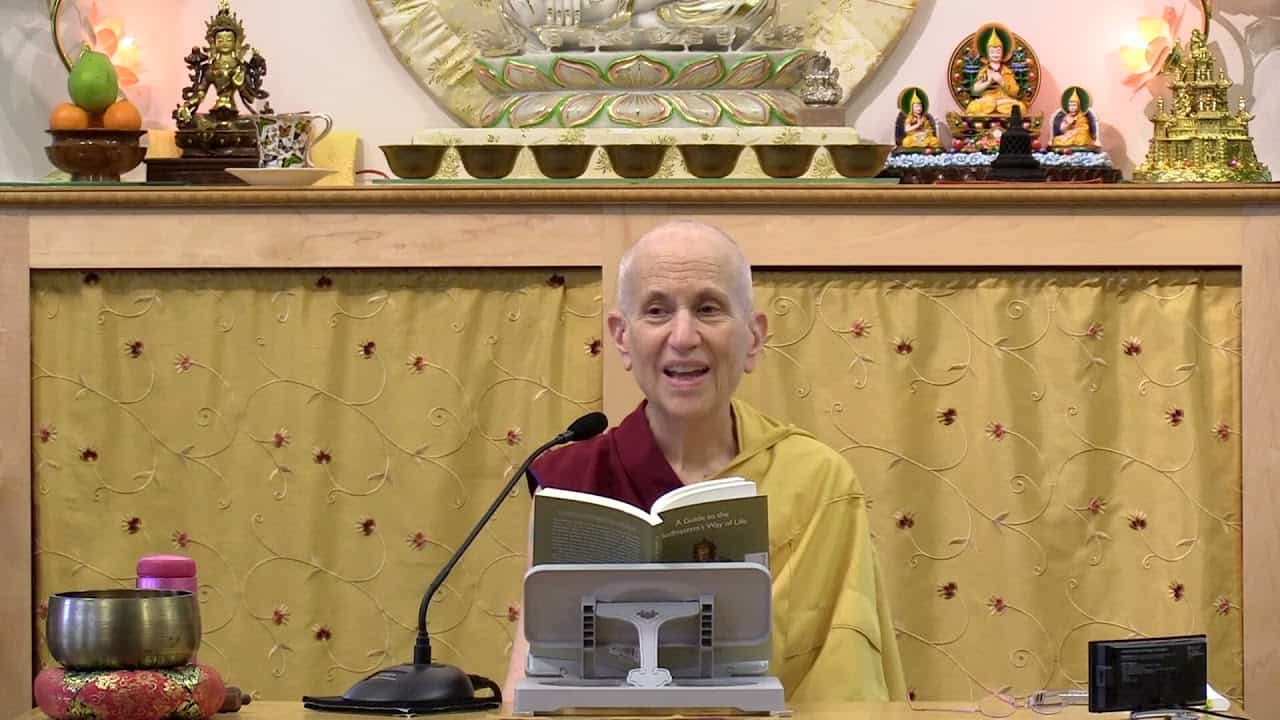The secret to happiness
An interview with Albert Ramos

Albert Ramos, an incarcerated person who has long studied the Dharma, writes extensively for this website about practicing while behind bars and recently wrote a children's book that was published by Sravasti Abbey. He was interviewed by Venerable Chonyi and Venerable Damcho for the January 2022 edition of Eastern Horizon.

Hermits meditating in high mountain caves. Masters giving empowerments to thousands of devotees. Erudite scholars translating sutras and writing commentaries. These might be some images that come to mind when we think of great Dharma practitioners, but some of them are engaging in deep and sincere practice where we least expect it—in prison.
Albert Ramos—also known as “Al” for short—is a Dharma student behind bars who has been corresponding with Buddhist nun Venerable Thubten Chodron for many years. He has just written his first children’s book, Gavin Discovers the Secret to Happiness, edited by Venerable Chodron and published by Sravasti Abbey in August 2021. Through an engaging story about a puppy named Gavin who befriends Bodhi, an older dog with cancer, Al shares with children and their parents what he has learned first-hand about love, compassion, and what truly brings joy in life. Delightful illustrations by volunteer Miguel Rivero bring scenes from the story to life.
We wrote to Al to find out more about his Dharma practice and his inspiration for writing this book, and were moved to learn how he is applying the Buddha’s teachings and maintaining a happy mind through the challenges of Covid. Here’s our interview with Al conducted via snail mail, in his own words.
Q: How did you meet the Dharma?
A: In 2007 or 2008 an acquaintance named Jerry offered to let me read a copy of Zen Mind, Beginner’s Mind by Shunryu Suzuki. The Buddhist concepts were completely foreign and I didn’t even finish the book. In fall of 2009 I received a copy of The Teaching of Buddha by the Buddhist Promoting Foundation. That little orange book stirred something inside me. Soon, I would begin to order Dharma-rich books.
Q: Please share with us what your Dharma practice is like.
A: My daily Dharma practice includes a morning meditation. Sometimes I do tonglen [taking and giving meditation] and I enjoy Chenrezig or Vajrasattva mantra recitation. Then I write in my gratitude/ happiness journal, followed by setting good intentions for the day. Also, I like to read from a Dharma book before heading out to class. Lately, I’ve been reading Don’t Believe Everything You Think by Thubten Chodron. It is a great commentary on Togmay Zangpo’s The Thirty-Seven Practices of Bodhisattvas filled with wonderful examples.
Q: How has the Dharma helped you in life?
A: The Dharma has helped me to transition from being a sad and angry person to a happy, compassionate, empathy-filled, and outgoing person. Despite being in prison, my heart and mind are liberated from depression and hostility. Dharma has given me peace, balance, and rationality.
Q: How is your mind different now that you have met the Dharma?
A: Through Dharma practice and meditation, I am much more mindful of my thoughts, speech, and actions. My mind no longer festers on objects, which causes suffering. Awareness of the Dharma allows me to think things through before acting from negative impulses.
Q: Tell us about some situations you encountered while incarcerated and how you practiced the Dharma to deal with them in a good way.
A: Starting in late January, my block became overwhelmed by Covid-19. Within 25 days, I moved locations five times. At one point I stayed in the gym and showered using a water hose in a janitor’s closet. The Dharma helped keep my mind calm as I understood the fleeting nature of each and every situation. There had been many days, months, and years of stability. It is only natural that change will come. Sharing with others the reality of change helped defuse our anger and frustration. Encouraging others that the uncomfortable situation would pass and that we still have it much better than others helped to some degree as well.
Q: What would you like people to know about you and what it is like to practice the Dharma in prison?
A: I like to make people laugh. I like to welcome new people because even though we seldom admit it, it can be scary when moving to a new prison where we don’t know anyone. There are not many Dharma practitioners in North Carolina’s prisons. However, everyone has the buddha nature. I like to view everyone as fully capable of buddhahood. My Dharma practice involves sharing kindness with everyone.
Q: What was your inspiration for writing the book Gavin Discovers the Secret to Happiness?
A: Initially, a psychologist I knew had a dog that suffered from and eventually overcame cancer. In addition, I do not have children, but view a children’s book as a way to reach and teach many children. Most of the characters are based on my family and friends. For example, Bodhi is based on my own Norfolk Terrier named Turtle. Gavin is a well-meaning dog, but he was taught to be mean to cats by other dogs. Sometimes children are taught at an early age to dislike and to hate other people for nothing more than looking different. I aim to help children think about their own biases and beliefs before acting on them.
Q: How has writing supported your Dharma practice?
A: Writing with a positive and healthy motivation helps me to stay centered on the Dharma. Thinking of ways to talk creatively about the Dharma and how to make wise choices through fictional characters gives a fresh face to the compassion-driven voice of Buddhism.
Q: What message do you hope people will take away from reading Gavin Discovers the Secret to Happiness?
A: After reading Gavin Discovers the Secret to Happiness, I hope that it helps people to be happy and content in any situation. Children and parents don’t have to be wealthy in order to be satisfied. True happiness comes from within and from spending quality time with others. It feels good to have spontaneous compassion.
Q: Are you working on your next book or books? Please tell us more about them.
A: Yes, I am working on another family story that involves animals. The story I am working on is specifically for children with incarcerated parents. Perhaps the book can be used as a tool in helping children to better understand their parents’ situation and their own.
Read selected reviews of the book here. You can purchase a copy on Amazon.
Al not only writes for children, he writes poems about his Dharma insights while practicing in prison too. Here’s a poem he wrote about contentment.
Big Piece
By Albert Ramos
Why is it that we always feel as if
we always get the short end of the stick?
It seems as if everyone else
has it better.
They get the fancy car,
win the lottery,
have the big piece of cake . . .
Recently in the chow hall I was in line for lunch.
Someone in a wheelchair approached
and I told him to skip in front of me.
They thanked me and I responded, “You’re welcome.”
I noticed that everyone seemed to have a huge,
fluffy, dark, decadent piece of chocolate cake.
And I said to myself, “now watch how small
my piece will be.”
What optimistic anticipation I had!
And sure enough, my piece seemed to have
been mauled, trampled on, and dropped from
a ten story building.
Just my luck! As I walked to the table
I told myself, “Take it easy. Isn’t complaining what
you’re supposed to steer away from?”
Isn’t contentment a rich enough nutrient to curb
this passing desire?
Would I rather have a crumbing tiny piece of cake
with two abled legs to walk and run on my own?
Or would I rather have a slab of cake too heavy
for one hand, falling off all sides of a tray,
and be confined to a wheelchair with one leg?
In that moment, the confinement of complaining was lifted.
The crumbling desire was abandoned.
There is a flavor far more rich than chocolate cake.
A bliss which has no doors for the six misleading senses.
It is a vision that understands
the eight mundane concerns.
Delicious nectar from the Three Precious Jewels
whose path can be walked
with two legs or not.
Incarcerated people
Many incarcerated people from all over the United States correspond with Venerable Thubten Chodron and monastics from Sravasti Abbey. They offer great insights into how they are applying the Dharma and striving to be of benefit to themselves and others in even the most difficult of situations.


